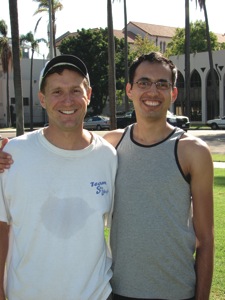-
- Sen. Craig files papers to withdraw guilty plea that stemmed from airport sex sting
- Coalition briefs Congress on meth, gays
- California Republicans wrestle with party values
- San Diego diocese to pay $198 million to settle 144 abuse claims
- Senate passes foreign aid bill easing abstinence restrictions
- Free condoms rejected over doubts about paper wrappers
- National News Briefs
- World News Briefs
san diego
Men’s Coming Out Group to host panel discussion
Local therapists will discuss emotional hurdles of coming out
Published Thursday, 13-Sep-2007 in issue 1029
Next Thursday, Sept. 20, the Men’s Coming Out Group at the San Diego LGBT Community Center will host a panel discussion featuring local San Diego gay male therapists Michael Kimmel, Paul Sussman, and Dan Offner. The panel will discuss the benefits of therapy, how to find and select the right therapist, and the major concerns of coming out.
“There are two main issues that emerge when someone decides to come out,” said Offner. “One is shame and the other is finding support…. [Therapy] creates a safe environment to kind of begin to even find words for one’s shame. It creates a space for somebody to explore themselves.”
But there is a stigma attached to those who seek therapy in the gay community. “There’s a fear of therapy,” said Bryan Levy, a co-facilitator for the Men’s Coming Out Group. “It’s like ‘Oh my god; I’m going to therapy. I must really be messed up’….Therapy is [also] very stigmatizing for us gay people. As my mom would say, ‘It’s for crazy people.’”
Because of such widespread misconceptions about therapy, many who seek it are ill informed and don’t know all the options they have, Levy explained.
“The person may not know that just because they go to a therapist and did select that therapist they don’t have to stay with that person if they don’t feel comfortable,” he said.
Many GLBT people hesitate to come out because of fear.
“I think there is a lot of fear of what other people will think,” Kimmel said. “A lot of my clients say that they’re scared of telling people that they have been lying to them all these years. They think that people will hate them, think they’re cowardly.
“I didn’t come out till I was 33. I was really homophobic. I grew up on a farm in Ohio, where they literally would have beaten the shit out of me if I had come out.”
Part of the fear of coming out has to do with what Kimmel calls “compartmentalization,” which he defines as isolating parts of yourself for specific people or specific situations.
Gay men both in and out of the closet “suffer from compartmentalizing their life into these little boxes. You know, like, ‘This person in my family knows [I’m gay] but this person in my family doesn’t know.’ It’s a sign of poor mental health when you have yourself in all these little boxes and you have to think ‘What box am I now in with this person,’” said Kimmel.
Levy created the monthly guest speaker event for the Men’s Coming Out Group in early 2006 for several reasons. “The men that were coming to the group had very little opportunity to see role models, and what I wanted to do was offer them a variety of people that were out and had public careers,” Levy said. “Another was to educate them about our politics and issues that are pertinent to being gay, bi, trans etc., and also to educate them about their health, STDs, HIV, etc.”
The Men’s Coming Out Group started approximately 20 years ago at The Center. Levy, who could not recall the group’s founding members, said the group was created “to fill a need that was determined in the community for a place for people who wanted to come out but had nobody to talk to.”
Between eight to 20 gay men attend the group weekly, said Arthur Lyla, another co-facilitator for the Men’s Coming Out Group. Members make up a diverse group in terms of age (from 18 to 80), ethnicity, religious affiliations and occupation.
Men come to the group for different reasons. “Some people come to this just figuring out that they’re gay and not even knowing how to be comfortable with themselves,” said Levy. “Some people come to this group that are out to their friends and work but they can’t tell mom. Some people come to this group, and they’re out everywhere except work.”
Members often stay with the group for years. Lyla came to the group in 2005 and a year later accepted a request to become one of its facilitators.
Meetings involve members sitting in a circle and sharing their feelings and thoughts on coming out. Facilitators emphasize a safe, confidential, and non-judgmental environment: “What is said in the group stays in the group,” said Levy. Although most talk about their experiences, participation is optional for those who just want to listen. A social/coffee hour follows each meeting.
Lyla says the group calls members who leave the group “out and proud,” graduates.
Both Dan Murray and Frank Santana are “graduates” of the Men’s Coming Out Group.
“The group was something I had to kind of push myself to go to,” Santana said. “But I eventually got to enjoy it a lot. I made some good friends that I’m still really close with. It also helped me come out to my mom and dad. It would have been much harder to come out without [the group]. So I’m just very grateful for the volunteers who make the group happen.”
|
|
Copyright © 2003-2025 Uptown Publications


